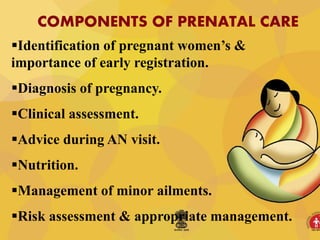Early prenatal care is the process of receiving healthcare support during the initial stages of pregnancy. It involves regular visits to healthcare providers, where physical exams, routine tests, and discussions about health and lifestyle may occur. While many processes unfold naturally during pregnancy, prenatal care provides a proactive approach to monitoring and supporting health during this period.
Contents
Identifying Potential Health Conditions
One of the advantages of early prenatal care is the opportunity for healthcare providers to identify potential health concerns early. Regular check-ups can provide a comprehensive view of the mother’s health, including monitoring blood pressure, weight, and key blood markers. Conditions such as gestational diabetes or high blood pressure may be identified sooner when medical attention begins during the early stages of pregnancy. Addressing these concerns promptly offers time to implement appropriate management strategies, which may contribute to improved health outcomes.
Supporting Nutritional Needs During Pregnancy
Pregnancy often brings changes in nutritional requirements to support both the mother and the developing baby. Early care includes discussions about appropriate dietary practices, including recommendations for specific nutrients. Healthcare providers may recommend appropriate levels of folic acid, iron, calcium, and other vitamins and minerals to support fetal development and maternal health. This guidance helps expecting mothers make well-informed dietary choices throughout their pregnancy.
Promoting Healthy Lifestyle Habits
Lifestyle habits can impact both the mother’s well-being and the pregnancy itself. Early prenatal care visits can often include conversations around areas such as physical activity, sleep patterns, and avoidance of substances like tobacco or alcohol. Healthcare providers may offer guidance on exercises that support energy levels and physical comfort during pregnancy. Additionally, lifestyle counseling may help in addressing concerns related to stress management or improving sleep quality.
Educating Expecting Mothers
Pregnancy is often a time of significant physical and emotional changes, and early prenatal care can provide expecting mothers with valuable education and resources. Healthcare providers may use these visits to answer questions, discuss the progression of pregnancy, and address any concerns. Topics may include understanding common pregnancy symptoms, preparing for labor, and exploring postpartum care. Access to this information allows pregnant individuals to feel more prepared and informed as they progress through each trimester.
Key areas addressed in prenatal education may include:
- Typical physical and emotional changes during each trimester
- Safe over-the-counter medications during pregnancy
- Basics of labor, delivery, and recovery preparation
- Post-birth resources, including feeding options and recovery tips
Building a Support Network During Pregnancy
Early prenatal care can also connect mothers with a supportive network during their pregnancy, including other specialists who may be part of the care team. Referrals to dietitians, physical therapists, or mental health specialists may occur during these visits as needed. For some pregnancies, additional specialized care or consultations may be discussed.
Community support options that may be recommended include:
- Prenatal classes or workshops covering childbirth and newborn care
- Peer support groups for expecting mothers to share experiences
- Digital resources or reading material related to pregnancy and postpartum care
Take the Next Step in Your Prenatal Care Journey
Seeking early prenatal care offers expecting mothers the chance to gain personalized guidance and support throughout their pregnancy. By addressing health needs and access to educational and community tools, early care helps provide a framework for maternal well-being. If you wish to learn more, connect with a healthcare provider who can guide you through the next steps and answer any questions.
